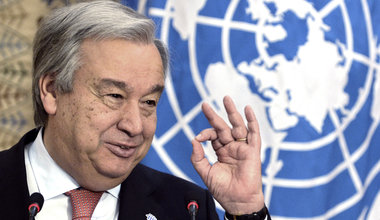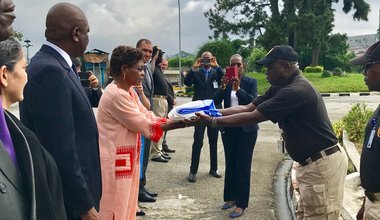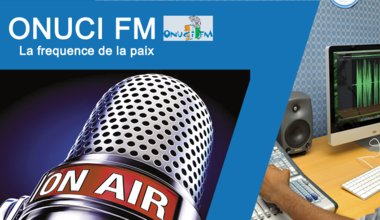INTERNATIONAL PRESS REVIEW WEDNESDAY, 2 JUNE 2010
Blaise Compaoré
pourrait se désengager du dossier ivoirien
France 24
- Dans
une interview accordée à FRANCE 24, en marge du sommet franco-africain de Nice,
le président burkinabé, Blaise Compaoré, revient sur sa médiation dans la crise
ivoirienne. Une médiation qu'il pourrait bien abandonner, faute de résultat.
L'interview intégrale de Blaise Compaoré sera diffusée mercredi 2 juin à 21H45
(GMT +2).
Blaise Compaoré
rendra-t-il son tablier de médiateur dans la crise ivoirienne? Dans une
interview accordée à FRANCE 24 en marge du sommet Afrique-France qui se tient
actuellement à Nice (sud-est de la France), le président burkinabé laisse
entendre que sa patience pourrait s'émousser si l'élection présidentielle,
maintes fois repoussée depuis l'accord de sortie de crise signée à Ouagadougou
en mars 2007, ne se tient pas avant la fin de l'année. "Mes limites pourraient
s'arrêter cette année, affirme Blaise Compaoré. En tout cas, je ne m'occuperai
plus de la médiation à ce niveau."
Initialement prévu
en novembre 2009, le scrutin a été plusieurs fois reporté en raison, notamment,
du cafouillage dans le processus de recensement des électeurs dont le coup
d'envoi avait été donné... le 15 septembre 2009. Des blocages que l'opposition
ivoirienne impute en partie à la mauvaise volonté du camp du président Laurent
Gbagbo. Le temps commence également à sembler long pour la communauté
internationale – dont la France, qui craint que le pays ne plonge dans la
guerre civile. Eventualité que Blaise Compaoré exclut. "Le travail pour la
réunification a débuté depuis longtemps. Dans le Nord, une administration
militaire et fiscale a été mise en place, observe-t-il. Des progrès substantiels
ont été enregistrés."...La défection de Blaise Compaoré porterait en tout cas un
sérieux coup au processus de stabilisation de la Côte d'Ivoire. Dans une Afrique
de l'Ouest francophone malade de ses crises successives, le chef de l'Etat
burkinabé, également médiateur dans la crise togolaise de 2006, et dans la
Guinée post-Lansana Conté (...).
Dutch trial
opens in Ivory Coast toxic waste case
AMSTERDAM
(AFP)
– The Dutch trial of a Swiss-based company whose chartered ship dumped waste
alleged to have killed 17 people in the Ivory Coast in 2006, opened here Tuesday
with the main defendants absent.
"There are
international rules, and these have to be followed," prosecutor Luuk Boogert
told judges in the trial of multinational Trafigura, the ship's captain and four
others accused of breaking environment and waste export laws in Dutch territory.
There was no one
for Trafigura in the dock of the Amsterdam district court for the start of the
trial -- the company's first for the events that saw caustic soda and petroleum
residues on board the Probo Koala shown away from the Port of Amsterdam and
redirected to Abidjan, where they were dumped on city waste tips. "The waste
went to a third-world country" instead of being treated in Amsterdam as planned,
an option that was less expensive but "dangerous", Boogert said. The waste,
slops from the cleaning of fuel transportation tanks, was pumped back into the
Probo Koala after waste treatment company Amsterdam Port Services (APS) demanded
a higher price for it being more toxic than previously thought.
Trafigura
declined to pay the increased price.
The company,
which denies any link between the waste and casualties, reached an out-of-court
damages settlement with the Ivory Coast government in February 2007 for 100
billion CFA francs (152 million euros, 225 million dollars).
The deal
exempted it from legal proceedings in that country.
A court case in
Britain was dropped after a 33-million-euro settlement for 31,000 plaintiffs was
reached in September last year on the basis of an independent experts' report
that found no link between the waste and 17 deaths and thousands of poisoning
cases claimed by the Ivory Coast.
But a United
Nations report published last September found "strong" evidence blaming the
waste for at least 15 deaths and several hospitalisations.
The first day of
the trial was taken up largely by modifications to the charge sheets, which saw
the number of charges against Trafigura reduced and any reference to hydrogen
sulphide in the slops dropped.
The company
risked a fine of up to 1.34 million euros (1.66 million dollars) before the
changes, whose effect on the penalty were not immediately clear.
The Ukrainian
captain of the ship, Sergiy Chertov, Trafigura employee Naeem Ahmed who
coordinated the operation, and waste treatment company Amsterdam Port Services
(APS), were also absent for the hearing. Chertov is being tried for allegedly
falsifying documents and lying to Dutch port authorities about the nature of the
waste that arrived at Amsterdam on July 2, 2006. One charge, that of
contravening waste import and export laws, was withdrawn against Ahmed.
Only APS former
managing director Evert Uittenbosch, who is charged in his personal capacity and
risks six years in jail, and the city of Amsterdam which administers the port,
were present in the dock for the start of the hearing.
They are charged
for not having prevented the exportation of dangerous waste.
"This is an
important trial, certainly, but justice will only truly be done when a court
judges what happened in the Ivory Coast itself," Greenpeace spokeswoman Mariette
Harjono told AFP at the court.
Dutch judges
have yet to decide on a bid by Greenpeace to have those responsible for the
waste dump tried in the Netherlands for crimes committed on Ivorian soil.
The current
trial is expected to conclude on July 2.
 ONU
ONU Nations Unies Maintien de la paix
Nations Unies Maintien de la paix



